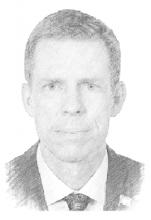You are here
70th anniversary of the Universal Declaration of Human Rights: More relevant today than ever
Dec 09,2018 - Last updated at Dec 09,2018
Today, 70 years ago, the General Assembly of the United Nations adopted the Universal Declaration of Human Rights.
The Universal Declaration is the result of intense discussions and negotiations of experts from all regions of the world. The role of Eleanor Roosevelt, who chaired the drafting committee, is well known. Less well-known is the fact that women from Denmark, Pakistan, the communist bloc and other countries around the world also made crucial contributions. Translated into hundreds of languages and dialects from Abkhaz to Zulu, the Universal Declaration set a world record, in 1999, for being the most translated document in the world. The human rights of the declaration are truly universal. These human rights that we have in common and solidarity with each other are what bind us together on our shared planet.
Thanks to the declaration, the dignity of millions has been uplifted, untold human suffering prevented and the foundations for a more just world have been laid. It has passed from being an aspirational treatise into a set of standards that has permeated virtually every area of international law. It has stood the test of time and the advent of dramatic new technologies and social, political and economic developments that its drafters could not have foreseen. The Universal Declaration gives us the principles we need to govern artificial intelligence and the digital world. It lays out a framework of responses that can be used to counter the effects of climate change on people, if not on the planet.
Side by side with the Charter of the United Nations, the Universal Declaration offers a timeless conflict prevention, development, security and social agenda:
The drafters of the declaration wanted to prevent another war by tackling the root causes, by setting down the rights everyone on the planet could expect and demand simply because they exist, and to spell out in no uncertain terms what cannot be done to human beings. As we experience painfully in this region of the world, equality, justice and freedom as expressed in the Universal Declaration could prevent violence and sustain peace. Respect for human rights, and effective, impartial rule of law to resolve disputes are at the core of development and peace, which His Majesty King Abdullah has reiterated on various occasions.
In 30 crystal-clear articles, the Universal Declaration shows us the measures that will end extreme poverty and provide food, housing, health, education, jobs and opportunities for everyone. The Sustainable Development Goals, which are at the basis for the close cooperation between the UN and Jordan, are grounded in international human rights law; the agenda offers critical opportunities to further advance the realisation of human rights for all people everywhere, without discrimination.
Gender is a concept that is addressed in almost every clause of the declaration. For its time, the document was remarkably lacking in sexist language. The document refers to “everyone”, “all” or “no one” throughout its 30 Articles. Nevertheless, women continue to be excluded from participating in both public decision-making processes and in decisions about resource distribution, family size and income usage at the family level. There is increasing awareness globally of gender-based discrimination and its adverse effect on development and on peace and security.
The Universal Declaration establishes the equal dignity and worth of every person. It confirms that the state has a core duty to promote standards of life that enable us to exercise our dignity and equality, in larger freedom. However, the protection of human rights is not only a responsibility of governments towards their citizens. We need to stand up for our rights and those of others. Each of us can stand up. We can take action in our own daily lives, to uphold the rights that protect us all and thereby promote the kinship of all human beings. Attacks on human rights by people who want to profit from hatred and exploitation erode freedom and equality locally and globally.
The UN is looking forward to its continuing cooperation with Jordan towards a resilient and prosperous country with equal rights and opportunities for all, based on our joint values as expressed in the Universal Declaration for Human Rights.
The writer is the UN resident and humanitarian coordinator in Jordan. He contributed this article to The Jordan Times













